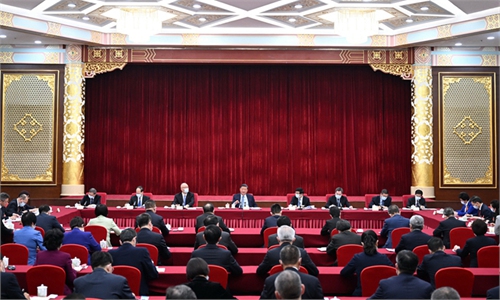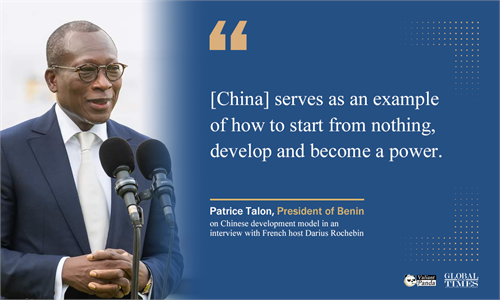China keeps development as top priority in 2023
NPC committee offers suggestions to help support growth targets in 2023

Residents and tourists enjoy nighttime activities such as shopping and cultural performances at Wanshou Palace commercial street in Nanchang, East China's Jiangxi Province, on February 18, 2023. As the weather warms up, the streets and alleys in Nanchang have become more lively, and the nighttime economy is helping to drive urban consumption. Photo: VCG
By continuing to give top priority to development in 2023, China will ramp up efforts to expand domestic demand, improve the business environment for private companies and prevent financial risks, among others, the Financial and Economic Affairs Committee of the 14th National People's Congress (NPC) suggested on Thursday.
The committee released a review report on the implementation of the national economic and social development plan in 2022 and a draft plan for the development in 2023 submitted by the State Council, China's cabinet.
It offered seven suggestions that Chinese economists noted will form effective support for the year's growth target at around 5 percent in spite of multiple headwinds.
This year marks the first year for China to fully implement the guiding principles of the 20th National Congress of the Communist Party of China (CPC), and it is of great significance for the country to do a good job in economic and social development, the committee said.
For starters, it is crucial to maintain steady and healthy economic performance. In addition to improving social psychological expectations and boosting confidence in development, it is also important to implement a proactive fiscal policy and a prudent monetary policy based on the basic tone of seeking progress while maintaining stability, it noted.
In 2023, national revenue is projected to reach 21.73 trillion yuan ($3.92 trillion), an increase of 6.7 percent from 2022, while expenditure is expected to reach 27.513 trillion yuan, an increase of 5.6 percent year-on-year, according to a draft budget submitted by the State Council on Monday.
The scale of local government special-purpose bonds will be appropriately expanded as well, with a ceiling of 3.8 trillion yuan to be set on new local government special-purpose debts, an increase of 150 billion yuan over last year, according to the draft budget.
This will be strong support for local development, especially after the three years of the fight against COVID-19, Cong Yi, a professor at the Tianjin University of Finance and Economics, told the Global Times on Thursday.
The committee also stressed the expansion of domestic demand, noting the need to increase urban and rural incomes through a variety of channels, while giving full play to active nongovernmental investment.
For the past three years, household consumption was largely restrained due to the pandemic, and releasing pent-up consumption will be the leading driver for the economic recovery this year, said Tian Yun, a veteran macroeconomic observer.
Based on the current recovery momentum, the increase in household consumption is expected to contribute more than 4 trillion yuan to the GDP this year, Tian told the Global Times.
Governments and businesses have stepped up efforts to boost consumption by issuing coupons or providing subsidies for businesses, holding shopping festivals and other moves. For instance, Zhengzhou in Central China's Henan Province issued 50 million yuan worth of auto purchase consumption coupons from January 1 to February 6, which directly boosted 2 billion yuan of auto sales, according to media reports.
It is also key to stimulate market dynamism through reform and opening-up, as well as to improve the business environment for private companies, the committee pointed out.
It's necessary to remove deep-seated institutional obstacles and give full play to the decisive role of the market in allocating resources. The nation will also encourage and support the development and expansion of private enterprises, and enhance management services for micro-sized, small and medium-sized enterprises, the committee said.
Additionally, more efforts should be rolled out to strengthen support for talent in education and science, effectively forestall and defuse major economic and financial risks, and stabilize employment and ensure people's wellbeing, it noted.
All these efforts will effectively pave the way for the around 5 percent GDP growth target this year, Cong said.
There is no denying that multiple challenges need to be addressed along the way, including sluggish external demand, geopolitical conflicts and others, experts said.
Yet, the 5 percent GDP target, which is below market expectations, is believed to have taken headwinds comprehensively into account, Cong said, noting that the nation has accumulated rich resources in talent and technology advancement, not to mention its colossal market.
China's population of 1.4 billion and a middle class of more than 400 million people are solid foundation and confidence for the growth of the world's largest developing country, Cong concluded.



